If you’ve ever had a glass container shatter in your freezer, you know it’s a mess to clean up. But can you avoid it by putting glass in the freezer safely? It turns out that there are a few things you can do to help keep your glass from breaking in the freezer. By following these simple tips, you can keep your glass containers safe and avoid a big mess.
Can Glass Go in the Freezer?
If you’re wondering whether you can put glass in the freezer, the answer is yes! However, there are a few things to keep in mind in order to keep your glass from breaking. Here are 7 tips for freezing glass:
1. Avoid sudden temperature changes.
2. Wrap your glass tightly.
3. Use a freezer-safe container.
4. Don’t overfill your container.
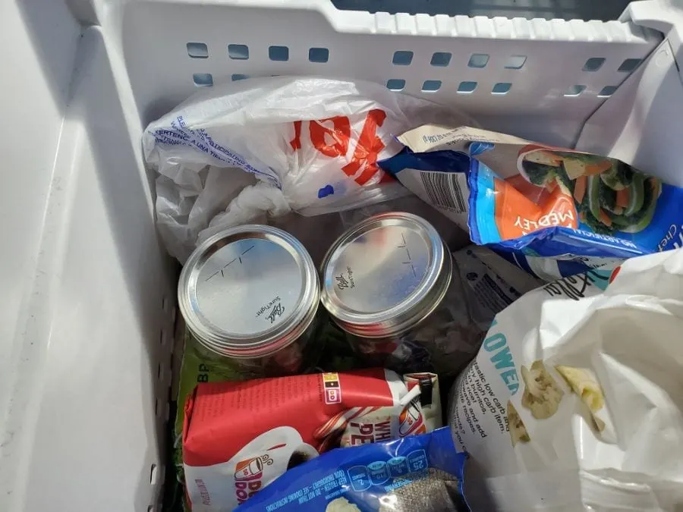
5. Leave space for expansion.
6. Label your container.
7. Use your frozen glass within a few months.
Why Does Glass Sometimes Break in the Freezer?
When the glass expands, it can break if there is something in the way that is preventing it from expanding. This is because the glass expands when it gets cold. When you put glass in the freezer, it can sometimes break.
How to Keep Glass from Breaking in the Freezer
If you’re wondering whether you can put glass in the freezer, the answer is yes! However, there are a few things you should keep in mind to prevent the glass from breaking. Here are 7 tips to keep glass from breaking in the freezer:
1 – Use Tempered or Freezer-Safe Glass
Freezer-safe glass is also designed to withstand extreme temperatures, but it may crack or shatter if it’s exposed to sudden changes in temperature. If you’re looking to store glass in the freezer, it’s important to use tempered or freezer-safe glass. Tempered glass is designed to withstand extreme temperature changes, so it won’t break when you move it from the freezer to the oven.
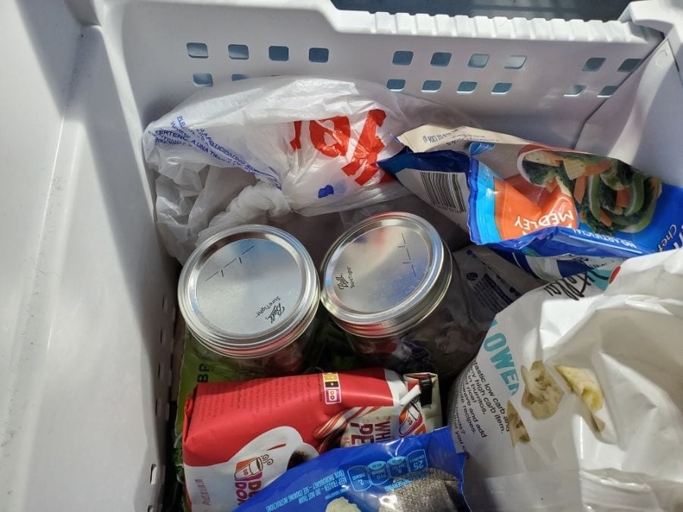
Second, don’t put hot food or drinks in glass containers before putting them in the freezer. First, make sure the glass is clean and dry before you put it in the freezer. Let them cool down first to prevent the glass from breaking. Any moisture on the glass can cause it to crack or shatter when it freezes. If you’re using regular glass, it’s important to take precautions to prevent it from breaking.
Sudden changes in temperature can cause the glass to break. So, take it out slowly and give it time to adjust to the new temperature before using it. Finally, be careful when you take glass out of the freezer.
2 – Leave Headspace
When storing glass in the freezer, be sure to leave some headspace at the top of the container. This will allow for expansion as the glass cools and prevents it from breaking.
3 – Don’t Tighten the Lids Immediately
If you’re looking to keep your glass from breaking in the freezer, one of the best things you can do is to not tighten the lids immediately. This will allow the glass to expand and contract as needed without putting too much pressure on the sides.
4 – Avoid Containers with Shoulders
If you’re using a straight-sided container, be sure to leave some headspace at the top to allow for expansion. Shouldered containers can cause the glass to break when frozen, so it’s best to use a container that is either straight-sided or has a slightly rounded bottom. When it comes to freezing glass, it’s best to avoid containers with shoulders.
Also, be sure to fill the container all the way to the top to prevent the formation of ice crystals. If you’re using a container with a slightly rounded bottom, be sure to place it on a flat surface in the freezer so that it doesn’t tip over.
Any dirt or debris on the surface of the glass can cause it to break when frozen. First, be sure to clean the glass thoroughly before freezing. If you’re worried about glass breaking in the freezer, there are a few things you can do to help prevent it.
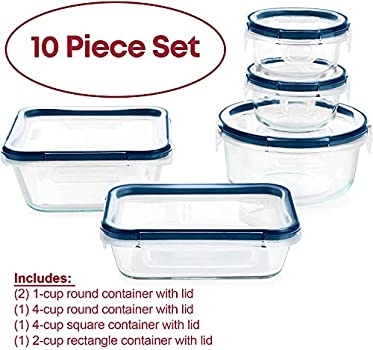
If you’re going to be taking the glass out of the freezer, be sure to let it thaw gradually by placing it in the refrigerator for a few hours first. Sudden temperature changes can cause the glass to break. Second, avoid sudden temperature changes.
Finally, be sure to wrap the glass tightly in plastic wrap or aluminum foil. This will help to prevent the formation of ice crystals and will also help to keep the glass from breaking if it happens to shift in the freezer.
5 – Change Temperatures Gradually
This will help to prevent the glass from breaking. Here are a few tips on how to keep glass from breaking in the freezer: When it comes to freezing glass, it’s important to change the temperature gradually.
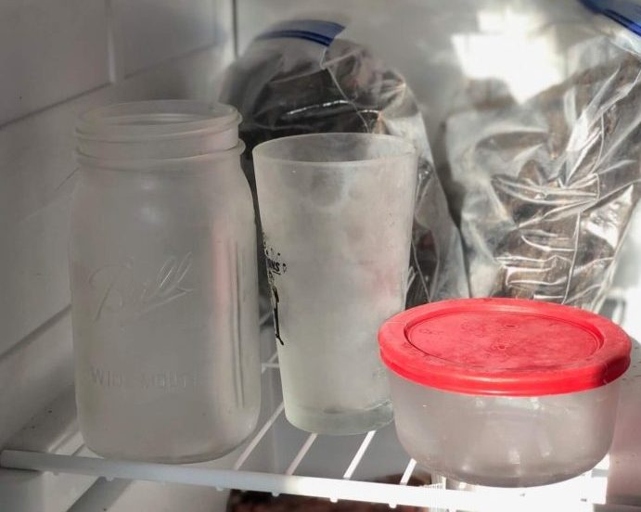
This will help to create a barrier between the glass and the cold air. 1. Wrap the glass in a layer of plastic wrap.
2. Place the wrapped glass in a freezer bag. This will help to keep the glass from coming into contact with any moisture.
3. Place the bag of glass in the freezer, making sure that it is not in direct contact with the cold air.
4. Allow the glass to slowly adjust to the cold temperature by leaving it in the freezer for a few hours before using it.
This will help to prevent the glass from shattering when it comes into contact with hot food or liquid. 5. When you’re ready to use the glass, let it sit at room temperature for a few minutes before using it.
6 – Avoid Narrow Containers
When it comes to freezing glass, the cardinal rule is to avoid using narrow containers. This will help to distribute the cold evenly and prevent the glass from breaking. Narrow containers are more likely to break when exposed to the cold temperatures of the freezer. Instead, opt for wider, shallower containers.
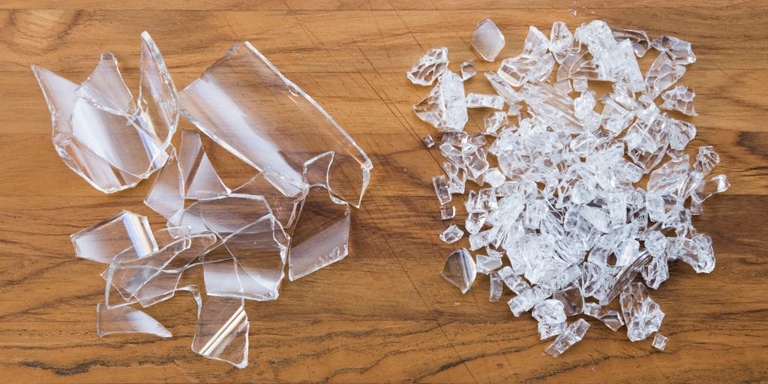
Additionally, be sure to place the container on a flat surface in the freezer so that it is not subject to any undue stress. If you must use a narrow container, be sure to wrap it tightly in plastic wrap or aluminum foil. This will help to insulate the glass and prevent it from breaking.
7 – Put Space Between Containers
You can do this by using plastic wrap or wax paper to separate the containers. If you’re using wax paper, be sure to put it between the layers of glass so that it doesn’t get caught and cause the glass to break. If you’re using plastic wrap, be sure to wrap it tightly so that it doesn’t come loose and cause the glass to break. When freezing glass, it’s important to put space between the containers to allow for expansion. This will help to prevent the glass from breaking.
What Are the Benefits of Storing Foods in Glass Containers?
Glass is also non-porous, so it won’t absorb food odors. And because it’s clear, it’s easy to see what’s inside, which can help you stay organized and prevent food waste. Glass is one of the most popular food storage materials because it is inert, meaning it won’t leach chemicals into your food.
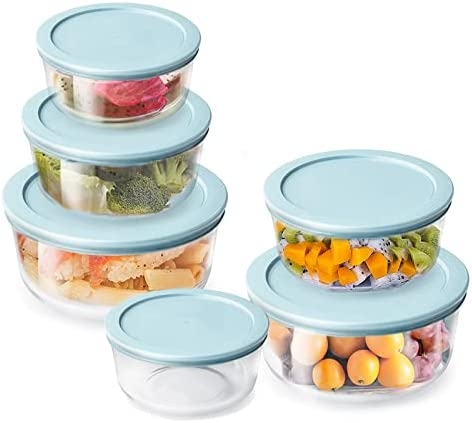
Plus, they can be used in the microwave, provided you use a microwave-safe glass. Glass containers are also easy to clean, and they can go from the fridge to the oven, making them versatile for cooking and reheating.
1 – They’re Non-Toxic
Glass is also a very stable material and does not break down over time like some plastics. Glass is one of the most popular materials for food storage because it is non-toxic and does not leach chemicals into food.
2 – They’re Easy to Clean
Glass is also dishwasher-safe, making it a convenient option for busy households. Glass containers are easy to clean because they are non-porous. This means that they won’t absorb food odors or flavors, and they can be washed with soap and water without worry of damaging the material.
3 – They’re Scratch Resistant
This means that you won’t have to worry about your food getting scratched and damaged when you’re storing it in a glass container. When it comes to storing foods, glass containers have a lot of advantages. One of the main advantages is that they’re scratch resistant.
Another advantage of glass containers is that they’re easy to clean. You won’t have to worry about food residue getting stuck on the sides of the container and being difficult to clean. Glass containers are also dishwasher safe, so you can easily clean them in the dishwasher.
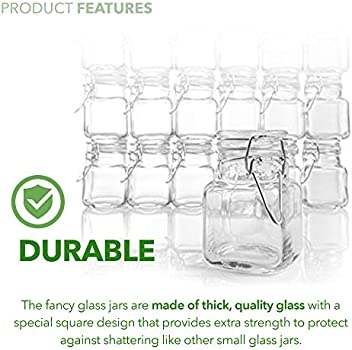
They won’t break easily, even if you drop them. Lastly, glass containers are also very durable. This makes them perfect for storing foods that you need to keep fresh for a long period of time.
4 – They Don’t Absorb Odors
One of the great benefits of storing foods in glass containers is that they don’t absorb odors. Glass containers can also help to keep the taste of your food fresher for longer. This is great news for those who are trying to avoid having their food take on the smell of whatever else is in the fridge or freezer.
5 – They Stay Crystal Clear
Glass is non-porous, so it doesn’t absorb flavors or odors from food like plastic or metal can. When it comes to storing food, glass containers have a lot of benefits over plastic or metal containers. Glass is also easy to clean and doesn’t retain stains the way plastic does.
BPA, for example, is a chemical that can be found in some plastics that has been linked to health problems like obesity and cancer. Another benefit of glass is that it doesn’t leach chemicals into food like some plastics can.
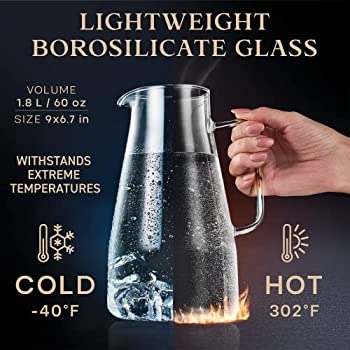
If you do have a glass container that breaks in the freezer, don’t worry – it’s still safe to eat the food. Glass is also a good choice for storing food in the freezer because it doesn’t break as easily as plastic or metal. Just be sure to clean up the glass before eating.
6 – They’re Relatively Inexpensive
Glass is a very versatile material and can be used for a variety of purposes, so it’s no surprise that it’s a popular choice for food storage. There are many benefits to storing foods in glass containers, but one of the most appealing is that they’re relatively inexpensive.
Glass is also easy to clean and is dishwasher-safe, so you can keep your containers clean and sanitary with minimal effort. Glass is non-porous, so it doesn’t absorb flavors or odors from food like some other materials can. This means that your food will taste fresher for longer when stored in glass.
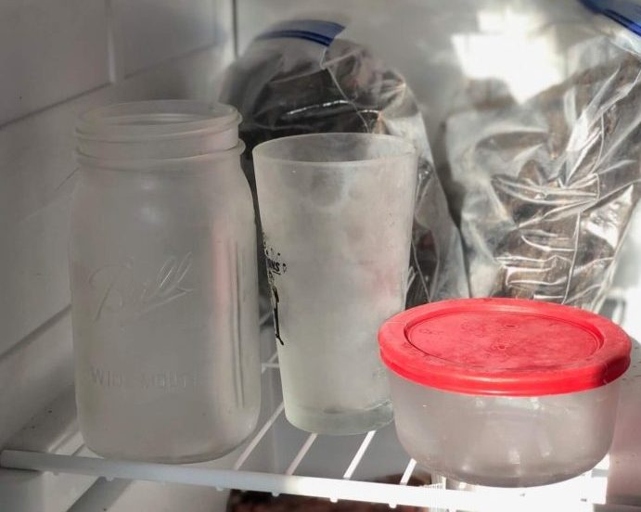
Another benefit of glass food storage is that it’s see-through, so you can easily see what’s inside and check if something has gone bad without having to open the container. This can help you save money by preventing you from accidentally throwing away perfectly good food.
Glass is also a very durable material, so it’s unlikely to break or chip if dropped. If you’re worried about your glass containers breaking in the freezer, you can purchase special freezer-safe glassware that’s designed to withstand extreme temperatures.
If you’re looking for an alternative to plastic containers, glass is a great option to consider. Overall, glass is an excellent choice for food storage because it’s affordable, versatile, and easy to use.
7 – They’re Reusable
Glass is also a very safe material to use for food storage, as it doesn’t leach chemicals into your food like some plastics can. Glass containers are also easy to clean and can be used in the microwave, making them very versatile. There are many benefits to storing foods in glass containers, one of which is that they’re reusable. This means you can save money in the long run by not having to buy new containers every time you need to store something.
Frequently Asked Questions
1. Can you put glass in the freezer?
Yes, but you need to be careful. If the glass is cold when you put it in the freezer, it can break.
2. How do you keep glass from breaking in the freezer?
There are a few things you can do:
-Wrap it in a towel or newspaper
-Put it in a plastic bag
-Put it in a container with a lid
3. What happens if glass breaks in the freezer?
If the glass is cold when it breaks, it can shatter. Shards of glass can injure you or damage your freezer.
4. Can you put glass in the fridge?
Yes, but you need to be careful. If the glass is cold when you put it in the fridge, it can break.
5. How do you keep glass from breaking in the fridge?
There are a few things you can do:
-Wrap it in a towel or newspaper
-Put it in a plastic bag
-Put it in a container with a lid
6. What happens if glass breaks in the fridge?
If the glass is cold when it breaks, it can shatter. Shards of glass can injure you or damage your fridge.
7. Can you put glass in the oven?
No, you should not put glass in the oven. Glass can break if it is heated too quickly.
8. What happens if you put glass in the oven?
The glass can break and shards can fly everywhere. This can be dangerous and cause damage to your oven.
9. Can you put glass in the microwave?
Yes, but you need to be careful. If the glass is cold when you put it in the microwave, it can break.
10. How do you keep glass from breaking in the microwave?
There are a few things you can do:
-Wrap it in a towel or newspaper
-Put it in a plastic bag
-Put it in a container with a lid
Final thoughts
Yes, you can put glass in the freezer. Just be sure to follow these seven tips to keep it from breaking:
1. Avoid sudden temperature changes.
2. Don’t overfill your freezer.
3. Wrap glass tightly.
4. Use a freezer-safe container.
5. Label your glass.
6. Know your freezer’s temperature.
7. Check for cracks before freezing.
